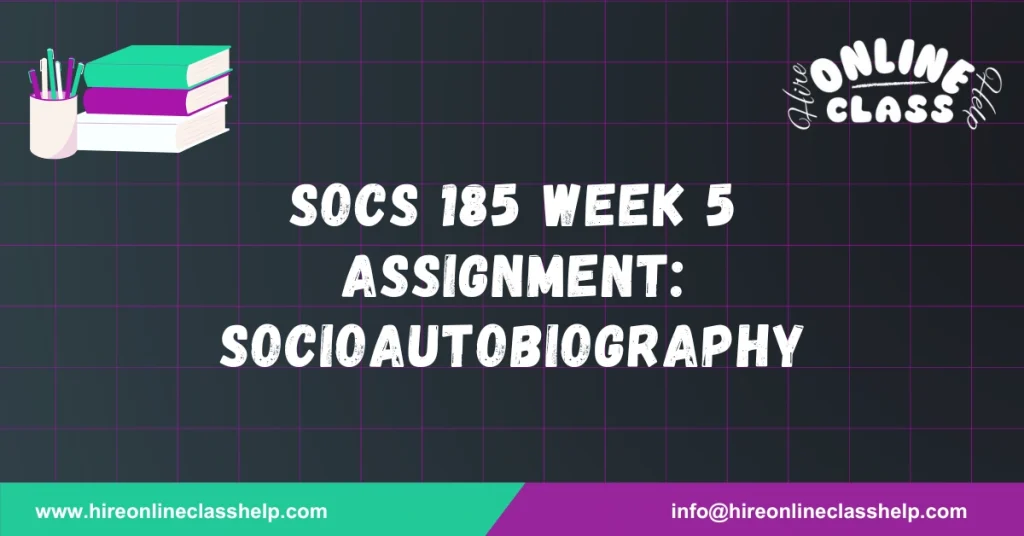






Name
Chamberlain University
SOCS-185 Culture & Society
Prof. Name
Date
This socioautobiography presents a personal exploration of my life, emphasizing how sociological concepts have shaped my development. By applying six major sociological themes and drawing upon theories from notable sociologists, I analyze how my upbringing, cultural heritage, family roles, and life transitions reflect broader societal forces. My Italian background, parental occupations, sexual identity, socioeconomic mobility, and adaptation to technological change all illustrate the interplay between personal experiences and structural influences.
An individual is shaped by a combination of social factors, including cultural heritage, family roles, social class, and community environments. My life has been molded by a household deeply rooted in Italian culture and strong family values, setting me apart from many of my peers. Events such as my early health struggles and my journey of embracing my sexual identity were closely tied to structural influences like class, occupation, and patterns of social mobility. Throughout this socioautobiography, I connect these experiences to broader sociological concepts that explain how personal lives reflect larger social dynamics.
I was raised in a middle-class immigrant family. My father migrated from Italy and initially worked as a housekeeping aide, a blue-collar position (Macionis, 2015). Over time, he advanced to a supervisory role at the same hospital. My mother, a first-generation American of Italian descent, pursued higher education and became a critical care nurse, specializing in PICC line insertions, representing a white-collar profession (Macionis, 2015).
Despite both parents working, high medical costs due to my chronic illness placed us in the lower middle class. As an only child, I received strong parental support. Over time, both parents advanced in their careers, which gradually moved our family into the upper middle class. This upward movement highlights the role of occupational achievement in social mobility.
| Parent | Occupation Start | Career Progression | Collar Type | Impact on Social Class |
|---|---|---|---|---|
| Father | Housekeeping aide | Supervisor, later Business Owner | Blue-collar | Upward mobility |
| Mother | Registered Nurse | PICC Line Specialist | White-collar | Primary breadwinner |
During my school years, I was known for being outgoing and humorous, which made me well-liked among peers. My involvement in competitive soccer created a strong sense of belonging within an “in-group” (Macionis, 2015). This experience was especially important as I came to terms with my sexuality in middle school.
Coming out as a gay female during adolescence could have led to rejection. However, I was fortunate to receive consistent support from both friends and family. This acceptance allowed me to remain part of the in-group, strengthening my self-confidence and helping me resist societal stigmas often associated with homosexuality (Macionis, 2015).
At age 13, my family’s socioeconomic position improved significantly. My mother earned a promotion, and my father launched a cleaning business, both of which increased household income and represented intragenerational social mobility (Macionis, 2015). Later, my certification as a pharmacy technician further contributed to personal mobility, allowing me to live in a desirable neighborhood across from New York City.
However, when my mother developed a rare illness that left her paralyzed, she had to retire, causing a decline in household income. Despite this setback, my father’s dual employment sustained our stability. This experience reflects both the fragility and resilience of socioeconomic status.
| Event | Result |
|---|---|
| Mother’s Promotion | Increased household income |
| Father’s Business | Additional income stream |
| My Certification | Enhanced personal mobility |
| Mother’s Illness | Slight downward mobility |
In my family, responsibilities were distributed equally, challenging traditional gender norms. Household chores rotated among family members, aligning with Ciotti’s (2018) perspectives on domestic equality.
My mother initially served as both breadwinner and caregiver, while my father balanced income-earning and household support. After my mother’s illness, her role shifted to homemaker, while my father became the sole provider and primary caregiver. My responsibilities also changed, as I provided emotional support and began contributing economically. These adjustments reflect Robert Merton’s role set theory (Macionis, 2015).
| Role | Before Mother’s Illness | After Mother’s Illness |
|---|---|---|
| Mother | Breadwinner, caregiver | Homemaker |
| Father | Supportive income earner | Sole breadwinner, caregiver |
| Me | Student, helper | Emotional support, independent earner |
My family had to adapt to technological advancements to stay connected with me and the broader world. Around my early twenties, my parents began using text messaging, adopting shorthand such as “LOL” and “TTYL” (Macionis, 2015). Their willingness to use these new communication methods helped bridge generational gaps.
Later, they joined Facebook to remain in touch with family in Italy, eventually expanding to platforms like Twitter and Instagram. This demonstrates how older generations adjust to digital culture and integrate into the online world (Macionis, 2015).
My life story reflects how social class, gender roles, cultural heritage, sexuality, and technology intersect to shape identity and opportunities. From being a medically vulnerable child in a lower-middle-class family to achieving upward mobility and embracing a confident identity, my experiences mirror larger sociological dynamics. Theories such as Merton’s role set and concepts like in-groups, gender equality, and technological adaptation help explain how personal narratives are deeply interwoven with society.
Ciotti, P. (2018, November 26). Re: Man’s work versus woman’s work [Online discussion group]. Week 5 Discussion: Man’s Work Versus Woman’s Work. https://devryu.instructure.com/courses/34492/discussion_topics/954667?module_item_id=4255328
Macionis, J. J. (2015). Society: The basics (13th ed.). Pearson Education.
| . |